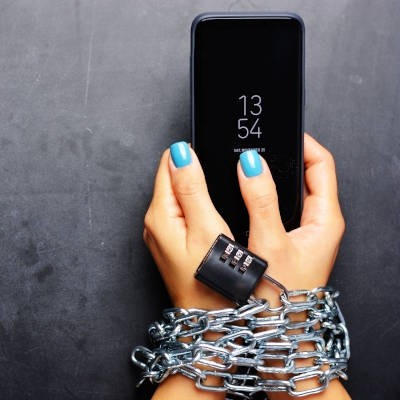Washington Works Blog
Smartphone Addiction and Its Effects
Nowadays, most of us use smartphones; and, yes, probably most of us use them more than is healthy. There are those, however, that have come to depend on their mobile device so much that it completely dominates their lives. As people become even more attached to their phone, the impact this behavior has on their lives becomes more and more detrimental.
The Skinny of It
“Everything in moderation” is a great piece of advice. If you drink too much water, your body’s sodium levels become dangerously low and can make you sick. It can even put you in a coma. So then is drinking water good for you? Of course, but too much of a good thing is always going to have negative effects.
Smartphone use is the same. Sure, you can now handle multiple tasks in a short period of time via your smartphone. You can keep conversations going with your friends, your family, your co-workers, and that special someone while walking down the street. You can play games, read a book, and scroll through social media to keep up on the world around you. You can work: write and send emails, update spreadsheets, use collaboration tools, and communicate through several methods. A wealth of knowledge is available in your pocket. Your smartphone can simultaneously be a home phone and a work phone.
Smartphone addiction is taking these benefits too far. It’s finding more in the soft glow of a Retina or Super AMOLED display than the rest of us can see. It’s ignoring the world around you to invest your time and energy into whatever is on the other side of the device. Young people tend to have the biggest problem. People between the ages of 15-to-24 check their phones an average of 150 times per day. In fact, 60 percent of surveyed college students said that they consider their smartphone usage excessive.
The Signs of Smartphone Addiction
Smartphone addiction is similar to any other addiction that the DSM-5 outlines, but the most similar is actually drug abuse. This means that mobile device addiction is actually a physical dependence on a mobile device. Symptoms include:
- Conscious use of smartphone in dangerous situations or when it is prohibited to use (driving, walking stairs)
- Phone use that causes social conflict
- Phone use that causes a loss of interest in other social or group activities
- Withdrawal, panic, and anxiety when smartphone isn’t in hand
- Lack of focus
- Social anxiety
- Relationship stress
- Eye pain
- Neck pain
- Insomnia
- Dependence on digital validation
Effects of Smartphone Addiction
Besides not being able to focus on tasks and getting less than ample sleep, smartphone addiction has shown to have some serious effects on a person’s personality. Among those found to have a smartphone addiction, depression and anxiety is more pronounced. In fact, in one study, these people have a 270-percent higher chance of having depression. Depending on a person’s personality traits, smartphone addiction can really be a hindrance to building a life that is productive and fruitful.
If you think you or someone you love has a smartphone addiction there are some things you can do to help. They include:
- Monitor usage - The best way to get over any addiction is to abstain from those behaviors. Giving yourself or a loved one a limit of time they can use their device can have positive effects. There are settings on all modern smartphones that can help track usage.
- Don’t use your phone for everything - There’s no denying that the smartphone is a one-stop-shop for many of yesterday’s physical tasks. To keep from using your phone too much, buy a physical alarm clock, carry a pen and paper with you, read real books. If you want to unlock yourself from your phone, you will need to have contingencies for the things you currently use your phone for.
- Turn off notifications - One of the main triggers for the smartphone addict is the constant stream of notifications that come in. If you turn off notifications, you will be less apt to constantly be distracted by your phone buzzing on your desk or in your pocket.
- Set aside time for smartphone tasks - Do you use your phone to check social media? With all the available options and all the people you correspond with sending you content it’s hard to unplug. Setting a time where you are able to use your phone for communication and recreation is a great way to limit your exposure to your phone.
Look, we all use our phones constantly, but if it is negatively affecting your life, you need to unplug.

Comments